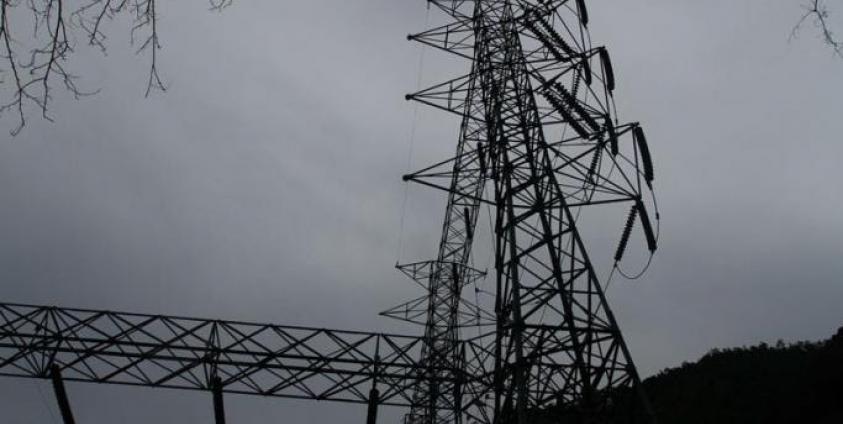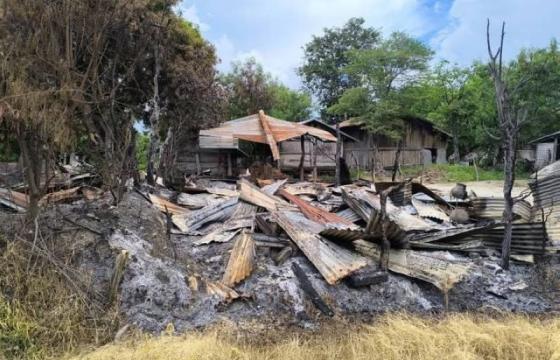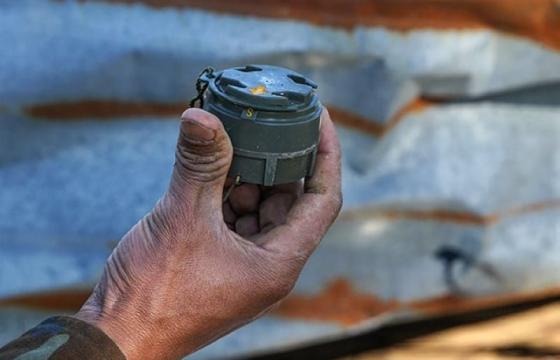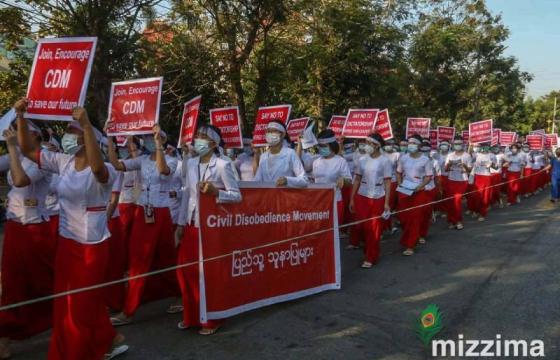Electric power pylon at Biluchaung Hydropower Station in Kayah State, Myanmar. Photo: Mizzima
In the history of human development, the relationship between social-economic development and environmental protection has always been a question of trial and error. The key to the continuous progress of human development lies in accurately understanding and weighing risks, seeking and perfecting remedial mechanisms as much as possible, and maximizing benefits, which is a recurring proposition in human history. One conclusion that does not seem to be a joke is that if people had been obsessed with the static protection of the natural environment from the very beginning, they might not even have the chance to walk out of the cave and make a piece of clothing out of animal skins or plants, let alone today's achievements. The natural environment itself has always been changing. Environmental protection is not to keep the environment unchanged, but only to change it in a way that will not destroy the existence of human beings while achieving sustainable development.
While the global understanding of development is constantly changing, there is now a broad consensus among countries that sustainable development that can promote prosperity, increase economic opportunities, enhance social welfare and improve environmental protection is the best way to improve the lives of people all over the world. In 2015, the United Nations (UN) proposed a series of sustainable development goals, replacing the original MDG. The ultimate goal of the new development goals is to eradicate poverty, protect the environment and promote world prosperity and development, so that everyone in the world can enjoy its benefits. The sustainable development goals proposed by the UN are very clear in terms of hierarchy and priority: "to protect the earth while promoting economic prosperity", that is, first of all, to develop the economy to achieve prosperity while emphasizing environment protection. The sustainable development goals proposed by the UN are broken down into 17 specific goals, the first three of which are poverty eradication, zero hunger, and good health and welfare. Therefore, in the strategy of sustainable development of the UN, human survival is the primary consideration, and the 13th to 15th goals are climate change and animal and plant conservation.
As is well known, Myanmar has suffered a long civil war and so far the issue of national reconciliation remains unresolved, so the country and society urgently need to restore peace and order. Survival and development are major challenges to Myanmar at present. However, power shortage and backward infrastructure have long been major bottlenecks hindering Myanmar's economic development. Unless these two problems are solved, the improvement of people's livelihood and welfare in Myanmar will not be achieved.
Countries in the Indochina Peninsula are located in the tropical monsoon climate region, with abundant rainfall (the annual rainfall in most areas is 1,500-2,500 mm), and high incidence of flood and waterlogging disasters. This region through which Mekong River, Salween River, Irrawaddy River, Red River and many other cross-border rivers flow is rich in water resources. From the perspective of natural resources endowment of countries in the Indochina Peninsula, it is a realistic and economic choice to make full use of water resources by using dams to regulate river basin flow. Wind power, natural gas, coal and nuclear power cannot solve the problem of power shortage in Myanmar, but can only be used as supplementary means of power generation.
Hydropower, which is a clean energy pattern that has been successfully verified in the past development experiences of many countries and the UN’s sustainable development goals, can provide clean and affordable electrical energy. In response, the UN report clearly stated: "At present, about 3 billion people worldwide lack clean fuel for cooking and are exposed to dangerous levels of air pollution. In addition, nearly 1 billion people, half of which are in sub-Saharan Africa, have no access to electric power. Fortunately, over the last decade, the use of hydropower, solar energy, wind energy and other renewable power has increased, and the proportion of energy used per unit of GDP has also declined."
Energy is a global concern that lies at the heart of almost all major challenges and opportunities. The UN's vision of sustainable development holds that a key to building a more sustainable and inclusive community and enhancing the ability to combat climate change and other environmental problems is to take advantage of new economic and employment opportunities, focus on energy popularization, improve energy efficiency and increase the use of renewable energy. In other words, the key to developing the economy and solving the problem of clean energy is to develop the economy first.
Globally, 13% of the population still has no access to modern electric power, and three billion people still cook or get warm by burning wood, coal or animal waste. Energy is a major contributor to climate change, accounting for about 60% of global greenhouse gas emissions. As of the end of October 2018, only 43% of households in Myanmar had access to electricity, with 57% still having no access. Moreover, Myanmar's electricity demand is increasing by 15% a year. When completed, the Myitsone Hydropower Station will generate 30 billion kilowatt-hours of electricity a year, nearly twice the Myanmar's total capacity in 2016. Once completed, the Myitsone Project will expand Myanmar's installed electricity capacity and increase the hydropower development rate by 20%. In addition to the increasing power supply, more importantly, such project will bring about leapfrog development to Myanmar's power industry, promote the upgrading of the power grid and create conditions for the country's economic and social development.
There have been different voices in Myanmar against the Myitsone Hydropower Station, with the objections mainly focusing on the environmental, ecological and geological disasters, resettlement, cultural preservation and other problems brought thereby. Is it certain to protect the environment without developing hydropower stations? Not so, it seems. Failure to change current environmental practices may essentially a failure to change production and life patterns supported by the current environment, such as fishing and reclamation of woodlands and mountains. Studies on the Amazon rainforest environment in the Americas show that low-level agricultural production does as much damage to the environment as modern industry and energy industry. With the population growth and the increase of demand for cultivated land and productive land in traditional agricultural and fishery patterns, more woodlands and mountains will be reclaimed, and vegetation will be removed, thus bringing problems of soil erosion and damage to the growth environment of animals and plants, and exceeding the bearing capacity of existing environmental and species resources.
Common problems such as environmental protection, culture and demolition have always existed in the construction of large dams, which are common in the opposition to dam construction in any region or country. Myanmar is not the first and will not be the last country to confront these problems which have long been concerned by the international community. Other countries and relevant international organizations have been discussing how to balance the relationship between development and environmental issues, and how to obtain clean energy through the construction of hydropower stations, so as to draw on the advantages and avoid disadvantages and maximize the benefits, rather than simply avoiding and stopping the pace of development. For example, the Mekong River Commission, the Asian Development Bank and the World Wildlife Fund have jointly launched the "Rapid Basin-wide Hydropower Sustainability Assessment Tool" as a means of reducing the environmental impact of hydropower. In 1998, "the World Commission on Dam" was established, and countries had an urgent need for global best practices in sustainable hydropower development. The World Commission on Dam, established under the auspices of the World Bank and the World Conservative Union (WCD), aims to respond to and resolve the growing number of local and international differences in regard to the construction of large dams, and has formed a set of increasingly perfect assessment mechanisms and compensation methods for the removal and settlement in large dam construction, which are led by international organizations, with the participation of banks, the national and non-governmental organizations and other stakeholders.
Therefore, the prevailing attitude of the international community towards dam construction is to admit that this power generation pattern has some shortcomings and defects, but the problems and challenges brought about thereby can be minimized through the construction of scientific and technological means, laws and mechanisms. After all, as clean energy, hydropower has more advantages and benefits. Weighing the advantages and disadvantages, the international community and other countries are more willing to adopt a pragmatic attitude to solve these problems than to give up eating because of choking. Myanmar needs to jointly discuss and promote the construction of Myitsone and other hydropower stations with a positive attitude, instead of simply evading and escaping.
As the former "breadbasket of Asia", Myanmar also attracted the attention of other Southeast Asian countries in the 1950s for its prosperity and development. However, after the Ne Win military era in 1962, Myanmar broke away from the tide of world development and missed many precious development opportunities. Myanmar, once a glorious country, can no longer afford to miss the opportunity for development. Due to its poor international reputation and image for a long time, Myanmar, which is striving to return and integrate into the international community, can solve the problem of energy shortage and economic development through the construction of Myitsone Hydropower Station. Moreover, the Myanmar government would be in unilateral default in case of terminating the Myitsone Project. Judging from the known situation, Myanmar will pay huge compensation and liquidated damages if that’s the case, which will cause huge losses to its government and people.
For Myanmar, its political and reputational losses are even greater. As a potential hot spot for international investment, it was once regarded by the international community and international capital as a new field of the international market and international investment after its democratic transformation in 2011. But in the years since, the efforts to attract foreign investment were slow, with Western countries slandering and accusing Aung San Suu Kyi and Myanmar government on the issue of Bengali (Rohingya). Myanmar's political environment and entanglements of political interests make it difficult for the capital markets to trust Myanmar's laws and institutions. In this context, the Myitsone Incident will also become a typical case that highlights the serious political risks and uncertainties as well as the insufficient construction of the rule of law and market-oriented mechanisms in Myanmar, and will be focused on by international investment priorities, thus aggravating the worries of international capital participating in Myanmar's development, and also reducing its speed of utilizing foreign capital to promote economic construction and realize the peace process.






